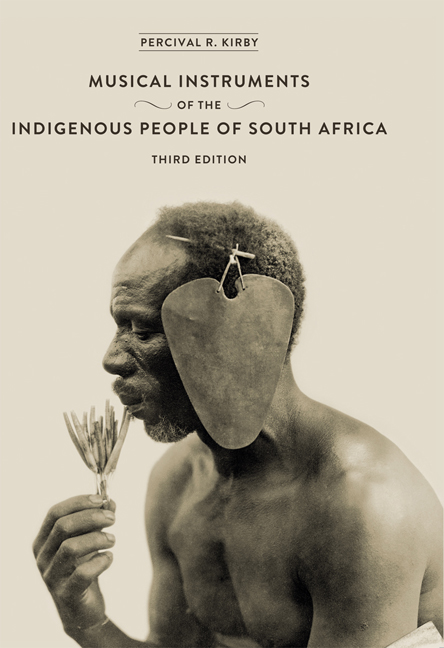Book contents
- Frontmatter
- Dedication
- Map
- Contents
- Foreword
- Preface to First Edition
- Preface to Second Edition
- Acknowledgements
- Acknowledgements to Third Edition
- List of Illustrations
- 1 Rattles and Clappers
- 2 Drums
- 3 Xylophones and ‘Sansas’
- 4 Bull-Roarers and Spinning-Disks
- 5 Horns and Trumpets
- 6 Whistles, Flutes, and Vibrating Reeds
- 7 Reed-Flute Ensembles
- 8 The ‘Gora’, A Stringed-Wind Instrument
- 9 Stringed Instruments
- 10 Bushman and Hottentot Violins and The ‘Ramkie’
- 11 Some European Instruments Played By Natives
- Appendix
- Addenda
- Index
- Frontmatter
- Dedication
- Map
- Contents
- Foreword
- Preface to First Edition
- Preface to Second Edition
- Acknowledgements
- Acknowledgements to Third Edition
- List of Illustrations
- 1 Rattles and Clappers
- 2 Drums
- 3 Xylophones and ‘Sansas’
- 4 Bull-Roarers and Spinning-Disks
- 5 Horns and Trumpets
- 6 Whistles, Flutes, and Vibrating Reeds
- 7 Reed-Flute Ensembles
- 8 The ‘Gora’, A Stringed-Wind Instrument
- 9 Stringed Instruments
- 10 Bushman and Hottentot Violins and The ‘Ramkie’
- 11 Some European Instruments Played By Natives
- Appendix
- Addenda
- Index
Summary
EVERY race inhabiting South Africa either has or had a drum of some kind at one period of its existence, but such drums vary considerably in both form and function.
Apparently the drum was not originally employed by the Bushmen. In spite of thorough investigation I have not been able to find any reference to it in the earliest records, and those which appear later seem to me to indicate clearly that the instrument was borrowed from the Hottentots. Borcherds described a drum which he saw played by the Bushmen near the Orange River in 1801: ‘The Bushmen were enjoying themselves with playing their native music, produced by beating on a pot covered with skin, a rude drum known as the rommelpot.’ He pointed out that the name is that known to the colonists, and also stated that drum-beating, as well as dancing and loud outcries, were indulged in by the Bushmen during thunder-storms and on moonlight nights. The name rommelpot, however, was that by which the colonists described the Hottentot drum; the origin of the application of this name to the instrument I shall deal with when discussing the drum of the latter race. The drum observed by Burchell in the hands of Bushman performers at Kaobi's kraal in 1812, and called by him a ‘water-drum’, appears to show the Hottentot influence distinctly. It is a great pity that Burchell did not obtain the name given by the Bushmen to this instrument, as thereby the question would probably have been cleared up. According to Burchell,
This drum was nothing more than a bambus or wooden jug having a piece of wet parchment strained over the top, and containing a little water. This instrument was occasionally inverted for the purpose of wetting the parchment, as often as it became dry. It was beaten with the right forefinger, by one of the women; while she regulated the pitch or quality of the sound by placing the forefinger and thumb of her left hand, upon the parchment. It seemed to be accurately in tune with the voices of the assembly; a concordance which could hardly be accidental.
- Type
- Chapter
- Information
- Publisher: Wits University PressPrint publication year: 2013



